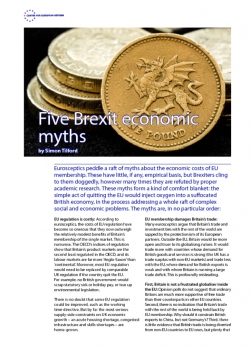
Five Brexit economic myths
Eurosceptics peddle a raft of myths about the economic costs of EU membership. These have little, if any, empirical basis, but Brexiters cling to them doggedly, however many times they are refuted by proper academic research. These myths form a kind of comfort blanket: the simple act of quitting the EU would inject oxygen into a suffocated British economy, in the process addressing a whole raft of complex social and economic problems. The myths are, in no particular order:
EU regulation is costly: According to eurosceptics, the costs of EU regulation have become so onerous that they now outweigh the relatively modest benefits of Britain’s membership of the single market. This is nonsense. The OECD’s indices of regulation show that Britain’s product markets are the second least regulated in the OECD, and its labour markets are far more ‘Anglo-Saxon’ than ‘continental’. Moreover, most EU regulation would need to be replaced by comparable UK regulation if the country quit the EU. For example, no British government would scrap statutory sick or holiday pay, or tear up environmental legislation.
There is no doubt that some EU regulation could be improved, such as the working time directive. But by far the most serious supply-side constraints on UK economic growth – an acute housing shortage, congested infrastructure and skills shortages – are home-grown.
EU membership damages Britain’s trade: Many eurosceptics argue that Britain’s trade and investment ties with the rest of the world are sapped by the protectionism of its European partners. Outside the EU, Britain would be more open and truer to its globalising nature. It would trade more with countries whose demand for British goods and services is strong (the UK has a trade surplus with non-EU markets) and trade less with the EU, where demand for British exports is weak and with whom Britain is running a large trade deficit. This is profoundly misleading.
There is no indication that #UK's trade with the rest of the world is held back by #EU membership
First, Britain is not a frustrated globaliser inside the EU: opinion polls do not suggest that ordinary Britons are much more supportive of free trade than their counterparts in other EU countries. Second, there is no indication that Britain’s trade with the rest of the world is being held back by EU membership. Why should it constrain British exports to China, but not Germany’s? Third, there is little evidence that British trade is being diverted from non-EU countries to EU ones, but plenty that EU membership has boosted Britain’s European trade. And it is trade with other wealthy countries producing similar goods that does most to boost competition and with it productivity growth; trade with emerging markets provides fewer of these ‘dynamic’ gains. Britain’s European trade has certainly been hit by weak eurozone domestic demand. But this will be a problem whether or not the UK is in the EU.
Inward investment is not linked to EU membership: Britain is home to more foreign investment than any other EU country. Eurosceptics are right to argue that this reflects the UK’s strengths: liberal product and labour markets, the integrity of its legal system, the attractions of its commercial clusters (like the City of London) and the English language. But they are wrong to argue that Britain’s success has nothing to do with its EU membership, and doubly wrong to suggest that Brexit would boost foreign investment in the UK by freeing the country of EU regulation.
For many foreign investors, especially in manufacturing and financial services, Britain’s access to the single market is a major pull factor. Outside the EU, the loss of market access and influence over EU rules and regulations would, for at least some of them, more than offset the other attractions of the UK as an investment location.
The eurosceptic assertion that a Britain freed of the EU would be able to deregulate its economy and hence attract more foreign direct investment (FDI) is based on a series of fallacies. First, EU regulations are not a drag on the economy; they generate trade between the member-states. For example, the EU’s drive to open up member-states’ financial sectors to competition has increased investment in the UK, which has a strong comparative advantage in finance. This would not have been possible without the EU setting common standards. The second fallacy is that the UK would recover regulatory sovereignty if it quit the EU. But in order to broker free trade agreements with the EU and US, Britain would have to agree to common regulatory standards in many areas. The third is that the British electorate would accept a dilution of environmental, social or labour standards following Brexit.
EU immigration is costly: Immigration into the UK from the EU jumped in 2004 following the accession of the Central and Eastern European countries and has remained relatively high since. Britain is now home to a comparable proportion of people from other EU countries as Germany and France, though still less than the Netherlands or Spain.
Many Britons are uncomfortable with what has happened. But immigrants from the rest of the EU are, on balance, positive for the UK economy. There is little evidence that they take jobs from Britons. And the limited evidence that EU migrants reduce the wages of low-skilled British workers suggests that any impact is small. Britain’s EU migrants are young and more likely to be in work than Britons, and thus pay more in taxes than they receive in benefits and public services.
Where there are negative effects for particular groups of Britons from EU immigration, these can be offset by public policy, for example by increasing the supply of public services in areas of high immigration, and changes to taxes and benefits to boost the disposable incomes of the low-skilled. Unfortunately, this is not happening: Britain is building a third fewer houses than it was in 2007; the supply of public services is too slow to respond to increased demand; and changes to the tax and benefit systems are making the poor worse, not better off.
Brexit would improve Britain’s public finances: Between 2014 and 2020 Britain’s net contribution to the EU budget will be around 0.5 per cent of GDP (currently £9 billion) per year. Eurosceptics argue that this money could be better spent at home. This is simplistic. First, the UK could end up paying into the EU budget even if it quits the EU. If the UK were to join the European Economic Area (EEA) and pay into the EU budget on the same basis as Norway, its budget contribution would not fall by much at all. In the unlikely event it was successful in negotiating an agreement similar to Switzerland’s, Britain’s contribution would fall by around half. Moreover, under both scenarios the UK economy would suffer – more under the Swiss option than the Norwegian one – thereby hitting tax revenues.
If Britain were to quit the EU’s orbit entirely, it would save the full 0.5 per cent of GDP. But it would only take a modest weakening of trade and investment following Brexit to weaken Britain’s fiscal position by 0.5 per cent of GDP. And, in any case, Britain would find it difficult to cut farm subsidies and development funds to poor areas of the UK.
Simon Tilford is deputy director of the Centre for European Reform.

